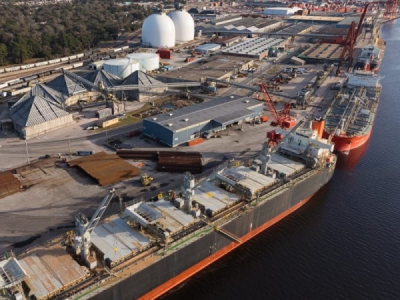
Posted on March 25, 2019
WILMINGTON – The North Carolina Division of Coastal Management has denied a permit the State Ports Authority had sought for dredging and construction related to expanding the Wilmington port’s turning basin to accommodate larger ships.
The ports authority applied for a Coastal Area Management Act, or CAMA, major permit to expand the dredging limits in its turning basin by 17.76 acres and build a vertical submerged sheet pile toe wall along the eastern edge of the expanded turning basin in a part of the Cape Fear River designated a primary nursery area, or PNA. The ports authority also proposed dredging to a foot deeper than its current authorized depth of 44 feet mean lower low water.
The Division of Coastal Management said it is required to deny permits for projects found to be inconsistent with state guidelines for areas of environmental concern or local land use plans and where the proposed development would lead to significant damage to fisheries resources.
The ports authority said the proposed project is needed to allow a newly expanded class of freightliners to call at the port. The authority sought to modify a CAMA major permit issued in 1987 that has been modified and renewed multiple times.
The port completed a prior expansion of the turning basin in August 2016 to accommodate post-Panamax vessels with a length of 1,150 feet and a breadth of 158 feet. That project included the removal of an existing bulk pier and dredging along the port’s side of the Cape Fear River to expand the turning basin from 1,200 feet to 1,400 feet.
The state Division of Marine Fisheries had indicated that the project would have significant adverse effects on PNA habitat, protected species, fisheries and fisheries resources and would also contribute to significant cumulative effects to these resources over time.
The Division of Coastal Management cited numerous findings in issuing its denial, including the effects on natural and public resources, the estuarine and wetland environment and state Coastal Resources Commission rules that state such projects avoid PNAs, shellfish beds, submerged aquatic vegetation beds and coastal wetlands and that boat basins be excavated no deeper than the depth of connecting waters.
The North Carolina Coastal Federation, which publishes Coastal Review Online, had also expressed to the Division of Coastal Management and the Army Corps of Engineers concerns about the project, objecting to the dredging in a PNA, loss of wetlands and a lack of transparency and opportunity for public involvement in the review process.
The ports authority may choose to appeal the denial, either by appearing before a judge in a contested case hearing or petitioning the Coastal Resources Commission for a variance.
A State Ports Authority official did not respond to a call for comment in time for this posting.
Source: coastalreview.org





